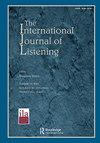A Discursive Approach to Young Adult Romantic Couples Use of Active Listening to Manage Conflict During Natural Everyday Conversations
Q1 Arts and Humanities
引用次数: 3
Abstract
ABSTRACT The present study uses a discursive psychological approach to examine naturally occurring bids at active listening as they arise spontaneously in the everyday interactions between young adult couples. To date, there is scant research examining in microanalytic detail how active listening works as it spontaneously emerges in everyday natural troubles-talk contexts between romantic partners. Five discursive methods for engaging in active listening are identified: 1) the use of psychological attributions, 2) judgmental questions, 3) subtle reframes, 4) story-topping, and 5) minimal recycles. The findings reveal that active listening is less about simply reflecting what one is hearing in neutral, open, and/or nonjudgmental ways, but is mostly about managing accountability, blame/attribution, identities, and perceived relational symmetries and asymmetries. The findings offer a new and exciting perspective for researchers interested in understanding how active listening spontaneously emerges and how couples use it in everyday natural relational contexts.青年浪漫情侣在日常自然对话中运用主动倾听处理冲突的探讨
摘要本研究采用话语心理学方法来研究年轻成年夫妇之间日常互动中自发出现的主动倾听的自然出价。到目前为止,很少有研究对积极倾听是如何在日常自然问题中自发出现的浪漫伴侣之间的谈话环境中进行微观分析。确定了五种参与积极倾听的话语方法:1)心理归因的使用,2)判断性问题,3)微妙的重构,4)故事顶部,以及5)最小限度的回收。研究结果表明,积极倾听不是简单地以中立、公开和/或非评判的方式反映自己所听到的内容,而是主要管理责任、指责/归因、身份以及感知到的关系对称性和不对称性。这些发现为研究人员提供了一个新的、令人兴奋的视角,他们有兴趣了解主动倾听是如何自发产生的,以及夫妻如何在日常自然关系环境中使用它。
本文章由计算机程序翻译,如有差异,请以英文原文为准。
求助全文
约1分钟内获得全文
求助全文
来源期刊

International Journal of Listening
Arts and Humanities-Language and Linguistics
CiteScore
4.70
自引率
0.00%
发文量
16
 求助内容:
求助内容: 应助结果提醒方式:
应助结果提醒方式:


